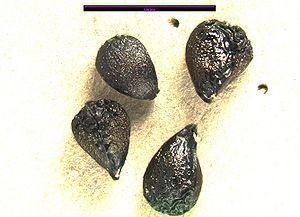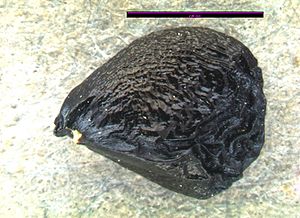Camassia leichtlinii
First overview block
Camassia leichtlinii (Baker) S. Wats. ssp. suksdorfii (Greenm.) Gould Synonyms Liliaceae Large camas, Great camas, Wild Hyacinth
Taxonomy DESCRIPTION:Perennial herb from a deep, egg-shaped bulb 2-4 cm long; flowering stems 20-100 cm tall, smooth. Basal leaves several to numerous, linear-lanceolate and grass-like, to 60 cm long, 1-2 cm wide, smooth, sheathing at the base, the margins entire; stem leaves lacking. Inflorescence a terminal raceme of five to many, stalked flowers, the stalks 1-4 cm long, spreading in flower, spreading to ascending in fruit; flowers pale to deep blue, rarely white, of six similar, distinct, petal-like segments (tepals), the tepals 20-40 mm long, 5-10 mm wide, twisting together over the ovary when withered; six stamens; one three-chambered pistil. Capsule fruits, egg-shaped to oblong, cross-ridged, 1-2.5 cm long; fruiting stalks often longer than bracts, spreading to ascending, curved in towards stem; seeds several to many, shiny black, 2-4 mm long (Douglas et al., 2002). Bloom Period Distribution Habitat- Vernally moist meadows in the lowland zone (Douglas et al., 2001). Grassy slopes and meadows (Pojar and Mackinnon, 1994).Nutrients-Nitrogen-rich soils. Moder and Mull humus (Klinka et al., 1989).Moisture Regime-Dry to moderately moist soils (Klinka et al., 1989).Shade Tolerance-Shade-intolerant (Klinka et al., 1989).
Uses Propagation Photo Gallery
Seed
Abbreviation: CALEI
Seed sample from: 2011
Average Measurement: 3.3 x 2.2 x 2.1
Measurement Range: L: 3 - 3.75, W: 2 - 2.5, D: 1.75 - 2.25
Features
Shape: Seed are narrower at hilum end, rounding off at opposite side. Hilum end ranges from tapered to pointy in shape.
Color: Seeds black, with conspicuous white hilum.
Surface: A wrinkled seam runs from hilum down the length of the seed in most. Seed is glossy, and wrinkled or bumpy.
Latitudinal Cross Section: elliptical ![]()
Longitudinal Cross Section: obovate ![]()
Basic Explanations and Assumptions:
The dimensions for the seeds are length x width x depth. The location of the hilum is used as the base of the seed, and the length is measured from hilum to the opposite apex. Where a style is present, the length is measured from the hilum to the bottom of the style. Width is measured at a right angle to the length at the widest part. Depth is measured at a right angle to the intersection of height and width lines.
Measurements included are the mean average for each measurement of ten separate seeds.
All measurements in millimeters unless otherwise noted.


